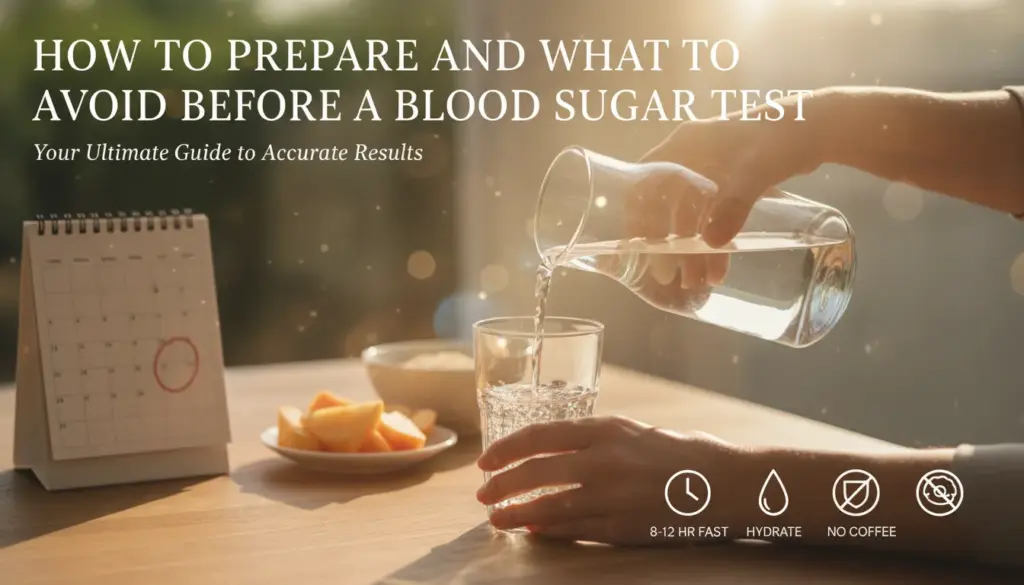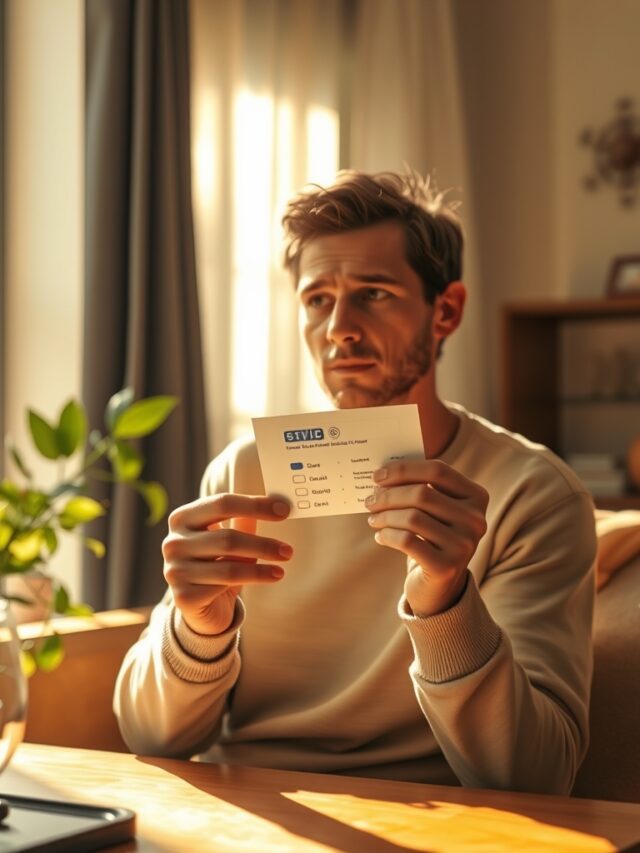Receiving a lab requisition for a blood sugar test can bring a mix of emotions. You know it’s an important step for your health, but you also want to be sure the results are a true reflection of what’s happening inside your body. The last thing anyone wants is a skewed number that leads to unnecessary worry or, worse, a missed diagnosis. This is where the right preparation becomes your most powerful tool.
Table of Contents
Proper blood glucose test preparation is more than just a set of inconvenient rules; it’s the foundation for an accurate diagnosis. This guide is designed to be your definitive resource, walking you through everything you need to know. We’ll cover the essential fasting rules, specific foods and drinks to avoid, and the common but easily preventable blood sugar test mistakes that could compromise your results.
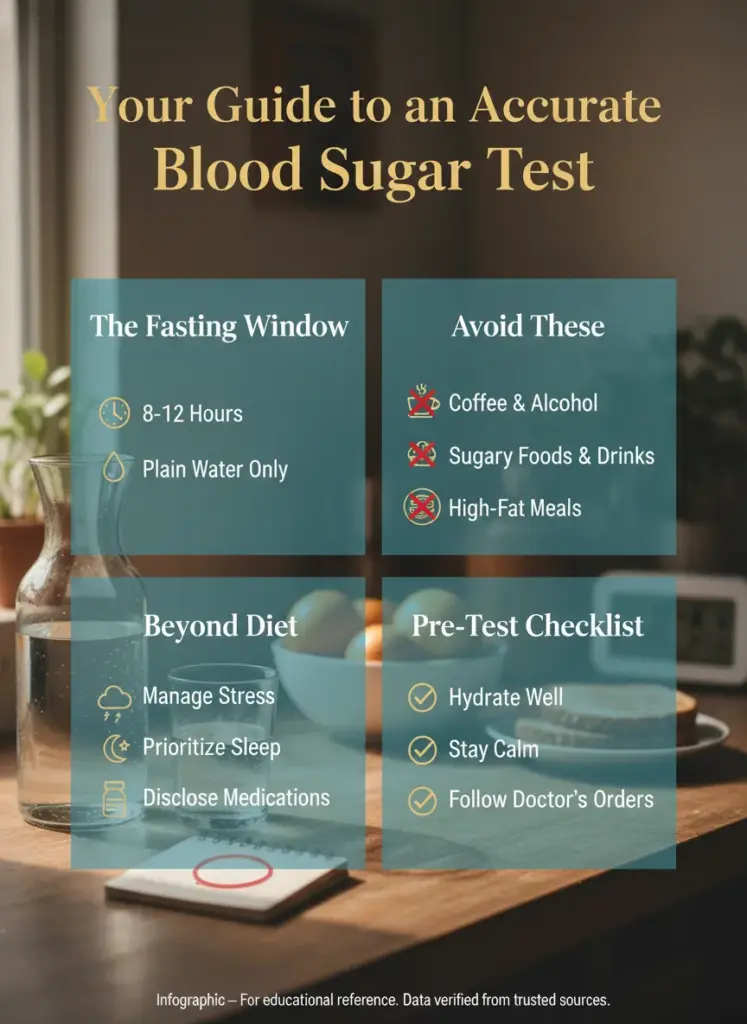
Why Proper Blood Sugar Test Preparation is a Critical Step for Your Health
Getting an accurate blood sugar reading isn’t just about passing a test. It’s about gathering precise data that helps you and your healthcare provider make the best decisions for your long-term wellness. An inaccurate result can send you down the wrong path, causing significant confusion and potential health risks.
What an Inaccurate Test Result Really Means
An inaccurate blood glucose reading can have serious consequences. It might mask an underlying condition like prediabetes or diabetes, delaying crucial intervention. Conversely, a falsely high number could lead to unnecessary anxiety, further testing, and even incorrect treatment plans.
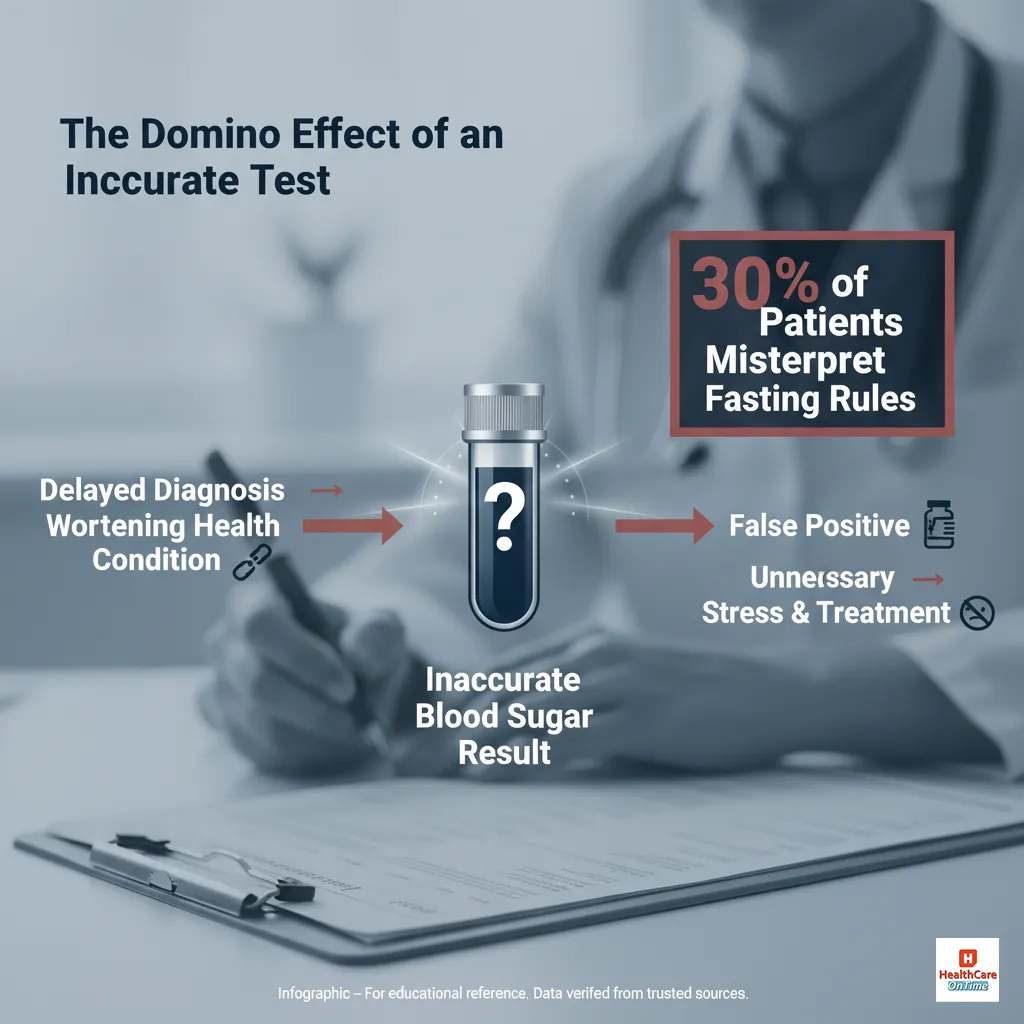
The scope of this problem is wider than many realize. Recent data from US outpatient clinics revealed a startling statistic: nearly 30% of patients misunderstand or misinterpret fasting rules before a lab test. This highlights a critical gap in patient education and underscores the need for clear, actionable guidance on what affects glucose test accuracy.
Building a Trustworthy Baseline for Diagnosis and Management
The primary goal of test preparation is to establish a true baseline. This means creating a controlled environment where your blood sample reflects your body’s natural glucose metabolism, free from the temporary influence of a recent meal, a stressful morning, or a cup of coffee.
Leading health organizations like the American Diabetes Association (ADA) emphasize the importance of standardized testing conditions. Following a consistent protocol for blood glucose test preparation ensures that your results today are comparable to your results in the future, allowing for reliable monitoring and effective management.
Mastering the Fast: The Golden Rules for a Fasting Glucose Test
For many blood sugar tests, fasting is the most critical component. It is a non-negotiable step that requires strict adherence to ensure the validity of your results. Let’s break down the essential blood sugar test fasting rules to eliminate any guesswork.
How Long to Fast for an Accurate Result
So, how long to fast before glucose test for an accurate reading? The standard medical guideline is to fast for a minimum of 8 hours, and sometimes up to 12 hours, before your blood is drawn. Your doctor will provide the exact duration required for your specific test.
This 8 to 12-hour window is not arbitrary. It provides enough time for your body to fully digest and absorb the nutrients from your last meal, allowing your blood glucose and insulin levels to return to a stable, resting state. One of the most practical fasting glucose blood test tips is to schedule your appointment for the early morning. This way, the majority of your fasting period conveniently occurs while you are asleep.
Does Drinking Water Help with Blood Glucose Test Accuracy?
This is a common question, and the answer is a resounding yes. You can and absolutely should you drink water before blood test appointments. Proper hydration before blood test is essential. When you are dehydrated, the volume of water in your bloodstream decreases, which can make the glucose in your blood appear more concentrated and lead to a falsely elevated result.
Recent health campaigns from blood glucose clinics have shown that simple hydration reminders can significantly boost patient compliance and test accuracy. However, it’s crucial to understand what water does and doesn’t do. A 2025 study clarified that while water intake ensures accuracy by preventing hemoconcentration, it does not artificially lower your body’s true blood glucose level.
What “Fasting” Truly Excludes: Beyond Just Food
The term “fasting” means abstaining from all sources of calories. This rule extends beyond solid food. During your fasting period, you must avoid:
- Coffee (including black coffee and decaf)
- Tea (including herbal teas)
- Soda and diet soda
- Juice
- Chewing gum (even sugar-free)
- Mints and cough drops
These items can stimulate your digestive system or trigger a metabolic response that can ultimately throw off your results. Sticking to plain water is the only guaranteed safe bet.
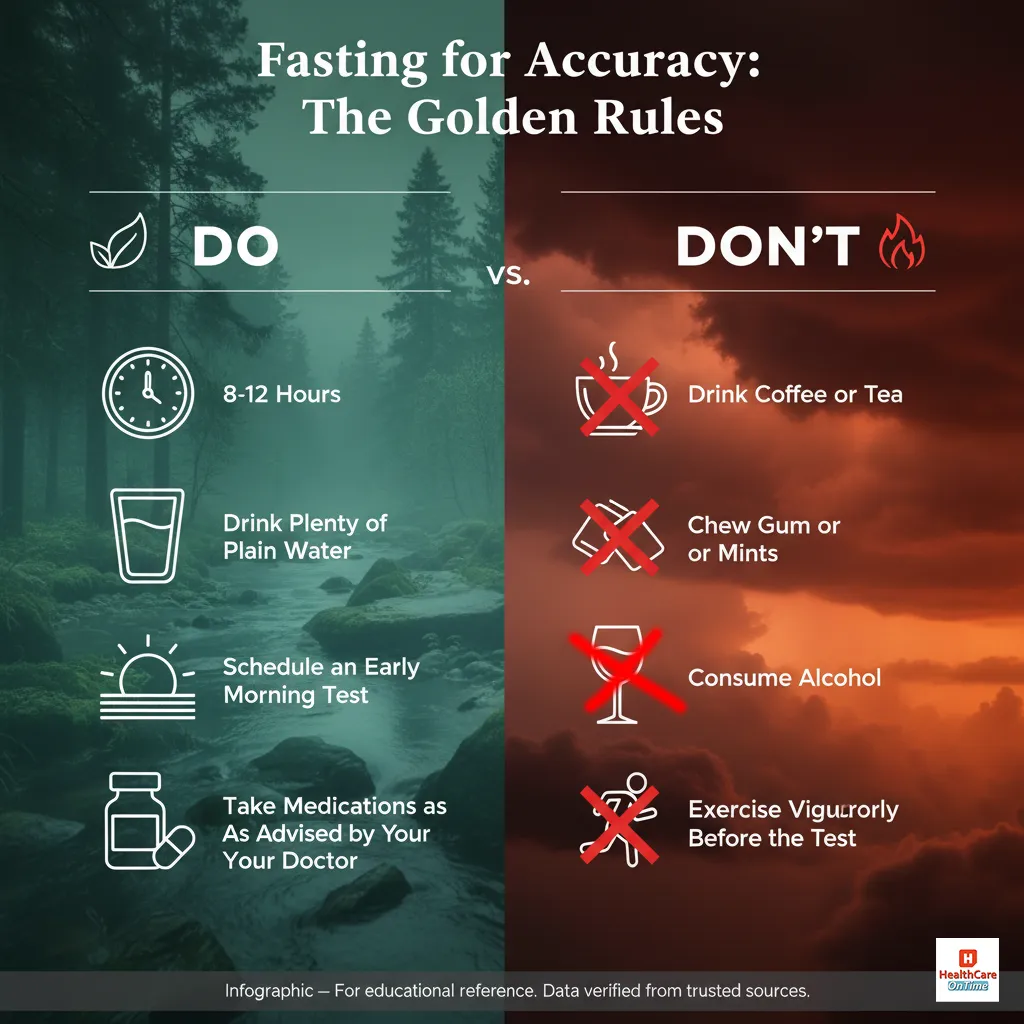
The Definitive Guide: Foods and Drinks to Avoid Before a Blood Sugar Test
What you consume in the 24 hours leading up to your test can have a lingering effect on your blood sugar. Knowing what to avoid before blood sugar test appointments can make the difference between a clear result and a confusing one. This includes paying close attention to the meal you have the night before blood glucose test.
The Night Before Your Blood Glucose Test: Setting the Stage for Success
Your last meal before the fast begins is important. It’s best to eat a normal, balanced dinner that includes a mix of lean protein, healthy fats, and complex carbohydrates. Avoid the temptation to have a large, heavy meal high in sugar or refined carbs, as this can impact your fasting glucose levels the next morning.
The Cleveland Clinic offers clear guidance on night-before preparation, advising patients to stick to their usual dietary patterns rather than making drastic changes. This helps ensure the test reflects your typical metabolic state. Thinking about what not to eat before a blood glucose test is a key part of the process.
Foods That Can Skew Your Glucose Test Results
Certain blood glucose test foods are notorious for causing spikes and fluctuations that can interfere with your results. These are the primary foods that affect blood glucose tests and should be avoided.
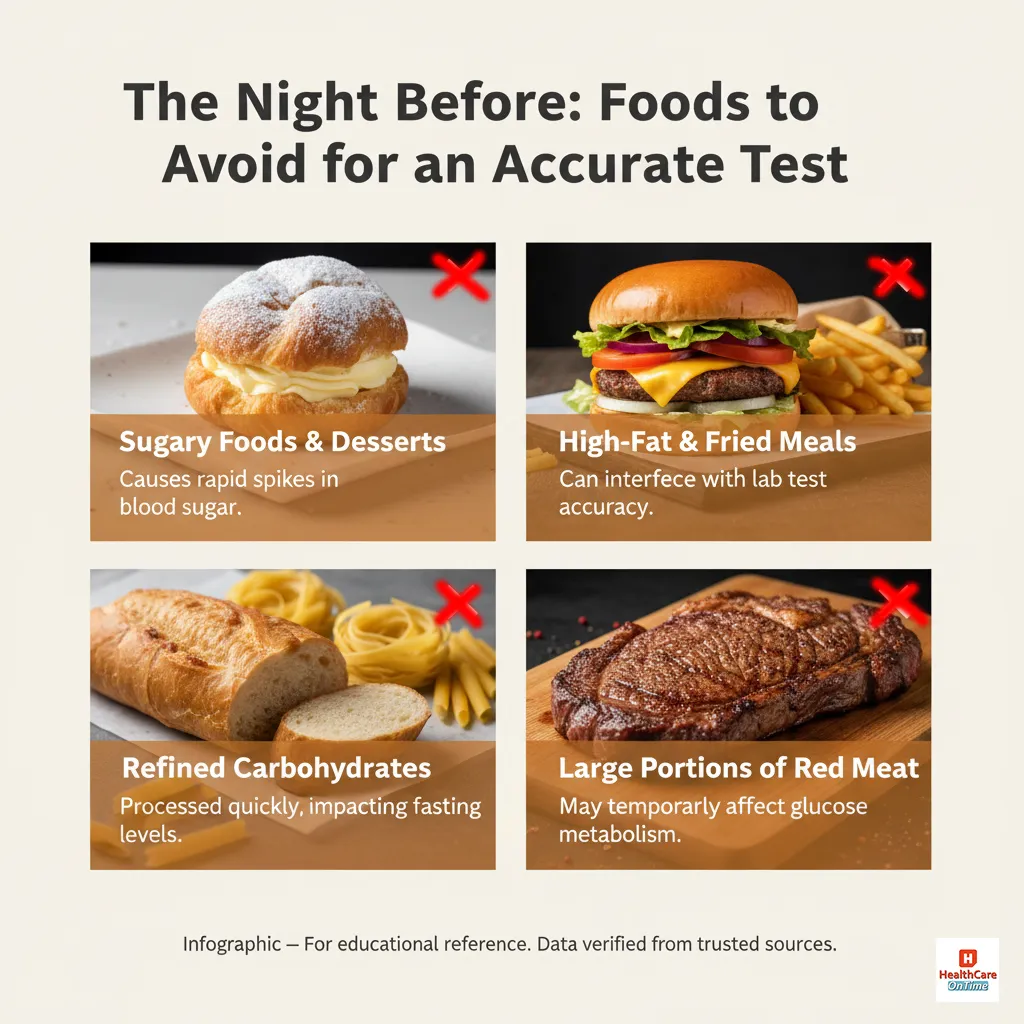
- Sugary Foods & Refined Carbs: This category includes the obvious culprits like candy, pastries, soda, and fruit juices. It also includes refined carbohydrates like white bread, pasta, and sugary breakfast cereals, which the body processes very quickly.
- High-Fat Meals: Foods that are fried or heavy in saturated fat, such as fast food, rich sauces, and fatty cuts of meat, can temporarily elevate triglyceride levels in the blood. In some laboratory methods, high triglycerides can interfere with the accuracy of glucose measurement.
- Excessive Red Meat: Some research suggests that very large portions of red meat can have a temporary impact on glucose metabolism and insulin sensitivity, making it wise to consume it in moderation the day before your test.
According to 2025 guidelines from the Mayo Clinic, the foods most likely to skew results are those that cause rapid and significant changes in blood sugar, making a simple, balanced pre-test diet the safest approach.
Drinks That Affect Blood Glucose Tests
Just as with food, certain beverages can have a significant impact. Understanding the drinks that affect blood glucose tests is crucial for accurate blood glucose test preparation.
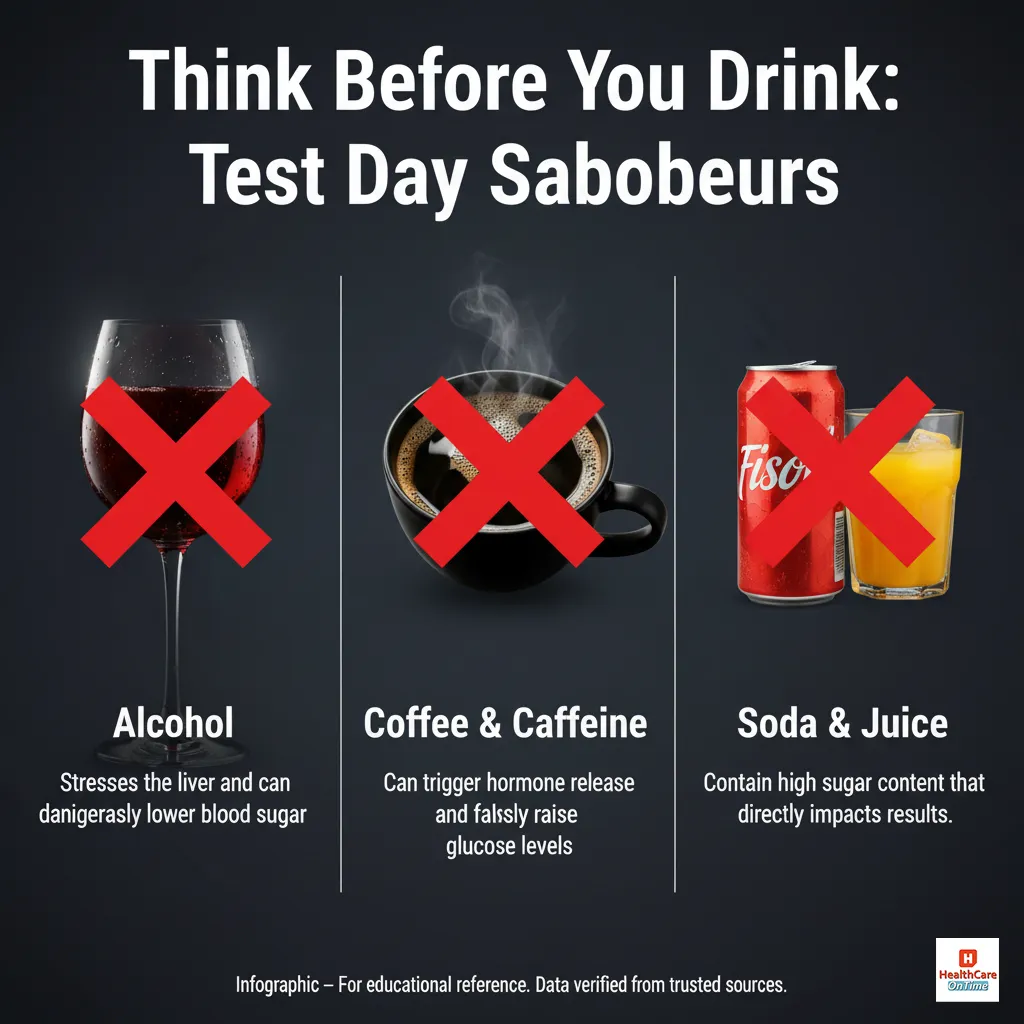
- Alcohol: Consuming alcohol, especially in the 24 hours before your test, can be problematic. It can cause your blood sugar levels to drop, potentially masking underlying hyperglycemia. It also places stress on your liver, the organ responsible for regulating blood glucose.
- Coffee & Caffeine: Even black coffee with no sugar can cause issues. Caffeine is a stimulant that can trigger the release of hormones like adrenaline, which may prompt your liver to release stored glucose into the bloodstream, artificially raising your levels.
- “Zero-Sugar” Drinks: Many artificially sweetened beverages can still provoke an insulin response in some individuals. Since the goal is to measure your body’s baseline, it’s best to avoid these and stick to plain water.
Comparison Table: What to Prepare vs. What to Avoid Before Your Test
For a quick and easy reference, this table summarizes the key dos and don’ts for your blood glucose test preparation.
| Action / Item | ✅ What to Prepare (Do This) | ❌ What to Avoid (Don’t Do This) |
| Fasting | Fast for 8-12 hours as directed by your doctor. | Eating or drinking anything besides water during the fasting window. |
| Hydration | Drink plenty of plain water before and during the fast. | Drinking coffee, tea, soda, juice, or alcohol. |
| Diet (Night Before) | Eat a balanced, normal-sized meal. | Consuming a large, high-sugar, or high-fat meal. |
| Exercise | Avoid strenuous exercise the morning of the test. | Engaging in a heavy workout right before your appointment. |
| Medication | Inform your doctor of all medications and supplements. | Stopping prescribed medications unless specifically told to do so. |
| Lifestyle | Get a good night’s sleep and try to remain calm. | High levels of stress or a sleepless night. |
Preparing for Specific Glucose Tests: From Routine Screens to Pregnancy
Not all blood sugar tests are the same. The preparation can vary significantly depending on the type of test you are having. Understanding the specific requirements for your test, especially for a glucose tolerance test preparation, is vital.
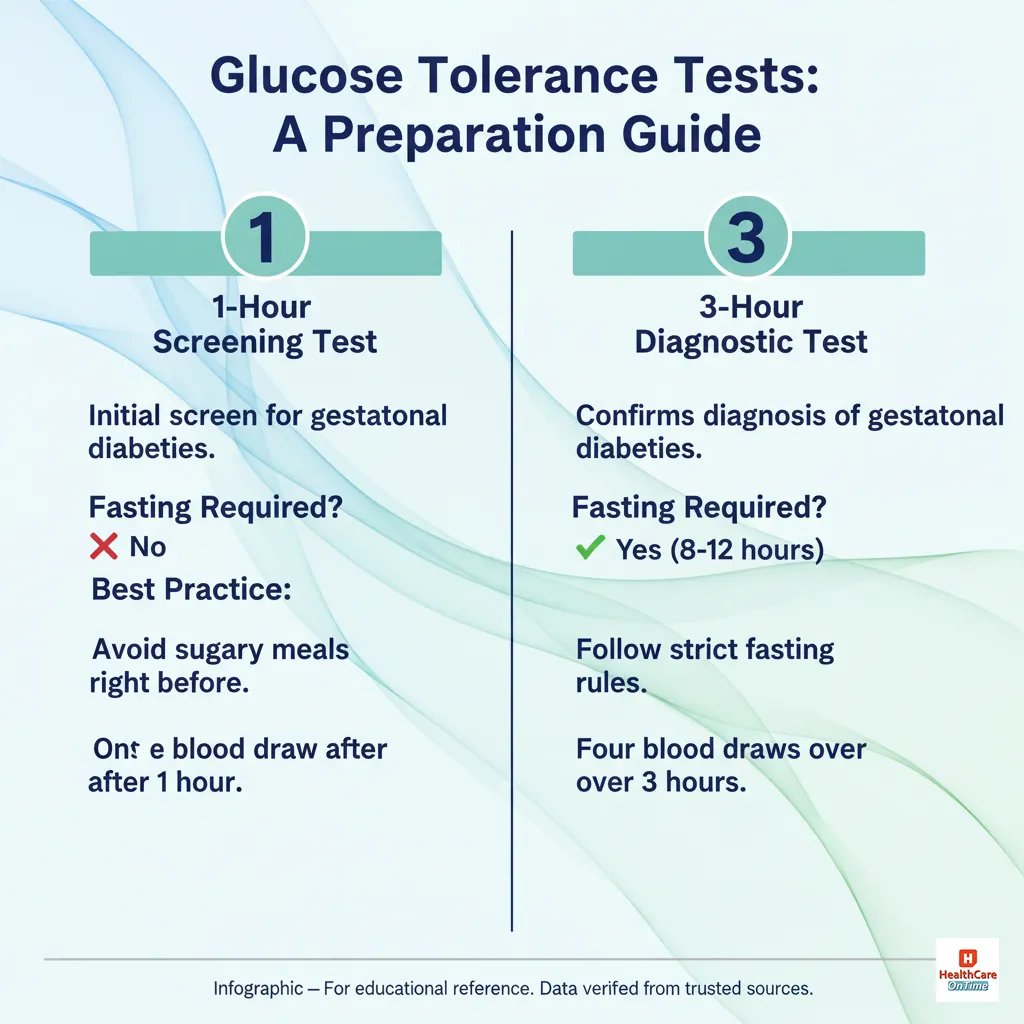
The 1-Hour Glucose Tolerance Test in Pregnancy
The 1-hour glucose tolerance test is a routine screening for gestational diabetes, usually performed between 24 and 28 weeks of pregnancy. The process for how to prepare for a 1 hour glucose tolerance test is generally less strict than for other tests.
Fasting is not typically required. However, it is advisable to avoid eating a meal or snack high in sugar right before your appointment. Upon arrival, you will drink a sweet liquid called Glucola, and your blood will be drawn one hour later to see how your body processed the sugar. A key part of how to prepare for a blood glucose test pregnancy is simply following the specific instructions from your obstetrician.
How to Prepare for the 3-Hour Glucose Tolerance Test
If the results of your 1-hour screen are elevated, your doctor will likely order a 3-hour glucose tolerance test to confirm a diagnosis. The glucose tolerance test preparation for this is much more stringent.
This test requires you to follow strict blood sugar test fasting rules for 8 to 12 hours beforehand. When you arrive, a baseline fasting blood sample will be taken. You will then drink a more concentrated glucose solution, and your blood will be drawn every hour for the next three hours. Recent CDC updates on testing procedures emphasize the importance of remaining seated and not eating or drinking during this period.
Tips for Accurate At-Home Blood Sugar Monitoring
The principles of good preparation also apply to daily at-home monitoring. Common blood sugar test mistakes here include not washing and drying your hands thoroughly before testing, using expired test strips, or not getting a large enough blood sample. Consistency in your technique is key to tracking your levels accurately over time.
Comparison Table: Understanding Different Blood Sugar Tests
This table helps differentiate the most common blood sugar tests, providing clarity on their purpose and preparation needs.
| Feature | Fasting Plasma Glucose (FPG) | Oral Glucose Tolerance Test (OGTT) | Hemoglobin A1c Test |
| What It Measures | Blood glucose at a single point in time after an 8-12 hour fast. | How the body processes a glucose load over 2-3 hours. | Average blood glucose over the past 2-3 months. |
| Requires Fasting? | Yes, 8-12 hours. | Yes, 8-12 hours. | No. |
| Who It’s For | Routine diabetes screening and diagnosis. | Diagnosing gestational diabetes; sometimes for prediabetes/Type 2 diabetes. | Diabetes diagnosis and long-term glucose management monitoring. |
| Preparation Notes | Standard fasting rules apply. | Strict fasting, followed by consuming a specific glucose drink at the clinic. | No special preparation needed, but results can be affected by certain conditions. |
Blood Sugar Test Mistakes: What Can Throw Off Your Glucose Levels?
Beyond food, drinks, and fasting, other physiological factors can significantly impact your blood sugar. Being aware of what can throw off glucose levels can help you avoid common pitfalls and ensure your test day goes smoothly. These are some of the most frequent blood sugar test mistakes.
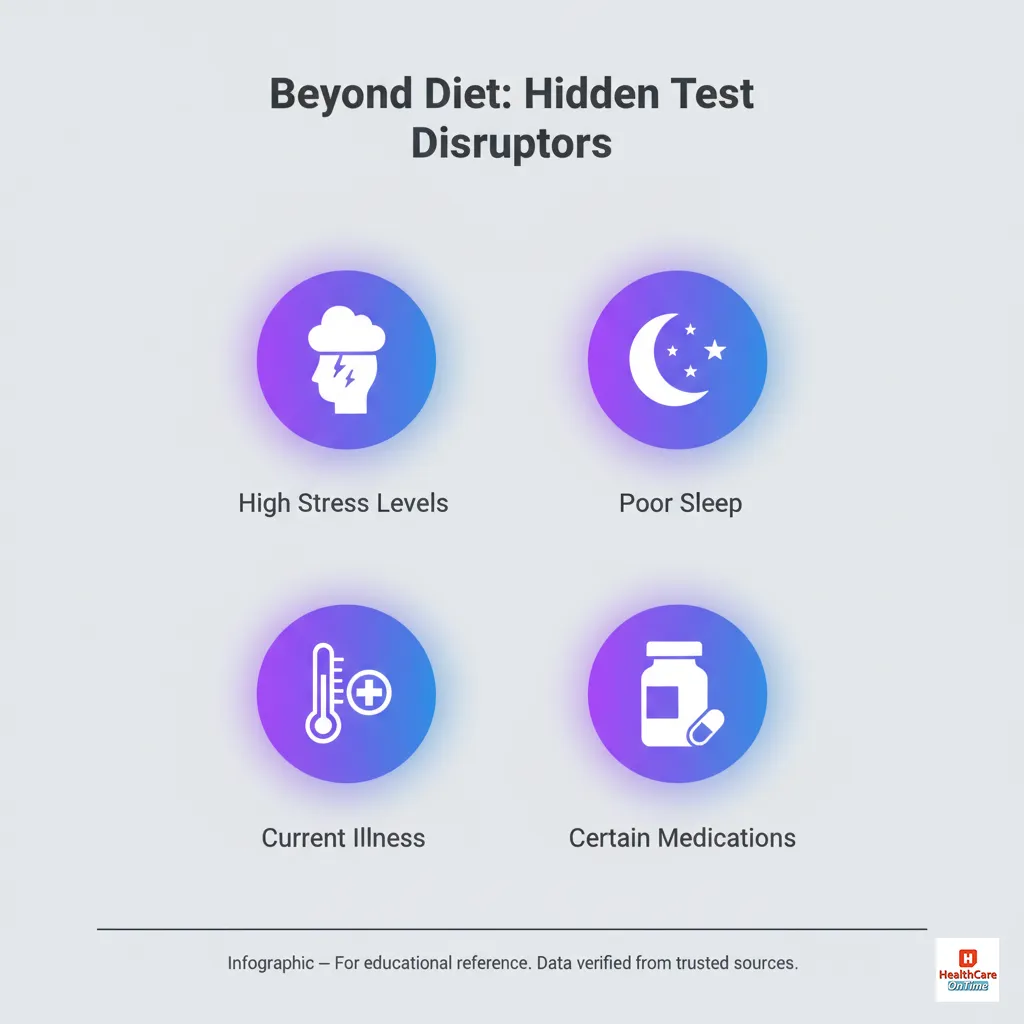
The Impact of Stress, Sleep, and Illness
Your body’s internal state plays a huge role in glucose regulation.
- Stress: Feeling anxious or stressed can trigger the release of cortisol, a hormone that can raise blood sugar levels.
- Lack of Sleep: A poor night’s sleep can impair your body’s insulin sensitivity, leading to higher-than-normal glucose readings.
- Illness: If you are sick, your body releases hormones to fight the infection, which can also elevate your blood sugar. It’s often best to postpone a routine test until you are fully recovered.
The “Two Finger Trick” for Diabetes: Fact or Fiction?
You may have encountered the term “two finger trick” diabetes in online diabetes forums on platforms like Reddit or Quora. This term typically refers to a self-testing technique where a person lances the side of their fingertip by bracing it with two other fingers for stability and better blood flow.
It’s important to clarify what this is and what it isn’t. It is a practical hack for getting a good blood sample, not a method to alter your results. There is no scientific evidence that this trick, or any form of acupressure, can lower your actual blood glucose levels before a test. Relying on such methods instead of proper medical guidance is a critical mistake.
Undisclosed Medications and Supplements
Many common medications can affect blood glucose levels. Some examples include:
- Corticosteroids (used for inflammation)
- Diuretics (water pills)
- Beta-blockers (for blood pressure)
- Certain antidepressants and antipsychotics
It is absolutely essential to provide your doctor with a complete list of all prescription medications, over-the-counter drugs, and supplements you are taking. Do not stop taking any prescribed medication unless your doctor specifically instructs you to do so.
Summary & Key Takeaways for Accurate Blood Glucose Testing
Navigating the requirements for a blood sugar test can seem daunting, but it doesn’t have to be. By understanding the reasons behind the rules and following a clear plan, you can feel confident that your results will be accurate and meaningful. Proper blood glucose test preparation empowers you to take an active role in your own healthcare.
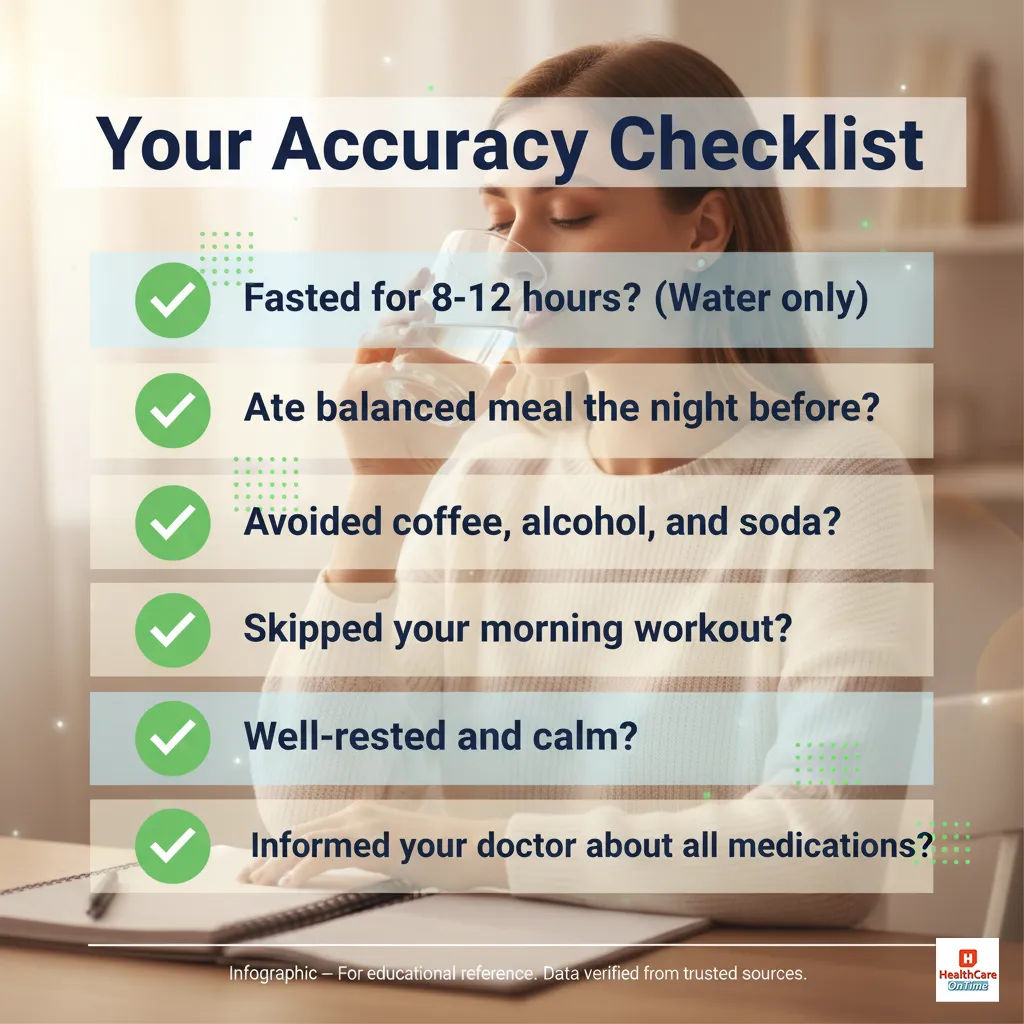
To ensure the best possible outcome for your test, remember these key takeaways:
- Fast Correctly: Strictly adhere to the 8 to 12-hour fasting window, consuming only plain water.
- Eat Smart: Enjoy a balanced, normal meal the night before and avoid consuming blood glucose test foods known to cause spikes.
- Hydrate Well: Good hydration before blood test is crucial for accuracy. Drink plenty of plain water.
- Avoid Saboteurs: Steer clear of alcohol, coffee, and strenuous exercise right before your test.
- Communicate Clearly: Always inform your doctor about medications, recent illnesses, or high levels of stress.
- Follow Specific Instructions: Pay close attention to the unique guidelines for specialized procedures like a glucose tolerance test preparation.
Frequently Asked Questions (FAQs)
What is the best thing to eat the night before a blood sugar test?
A balanced meal with lean protein, complex carbohydrates (like quinoa or brown rice), and vegetables is ideal. Avoid meals that are excessively high in sugar, refined carbs, or unhealthy fats.
Can I drink black coffee while fasting for a blood test?
No. Even without sugar or cream, the caffeine in coffee can stimulate hormonal changes that may cause your blood sugar to rise, interfering with a true fasting result.
Does drinking a lot of water lower blood sugar before a test?
Drinking water does not lower your actual blood glucose level, but it prevents dehydration. Dehydration can make your blood more concentrated, which can lead to a falsely high reading.
What are the most common reasons for failing a 1-hour glucose test?
An elevated result on the 1-hour test doesn’t automatically mean you have gestational diabetes. It can be influenced by what you ate right before the test, stress, or simply how your body handles a large, rapid dose of sugar. It indicates that further testing with the 3-hour OGTT is needed.
How long is too long to fast before a glucose test?
Fasting for longer than 14 hours is generally not recommended, as prolonged fasting can also stress the body and potentially affect the results. Stick to the 8 to 12-hour window prescribed by your doctor.
Can I chew gum while fasting for a blood test?
No, even sugar-free gum should be avoided. Chewing can stimulate your digestive system and the sweeteners in sugar-free gum can sometimes cause an insulin response in the body.
What can cause a false positive result on my blood glucose test?
Several factors can cause a falsely high reading, including not fasting correctly, high stress levels, illness, certain medications, and dehydration.
Is it better to test blood sugar in the morning or at night for accuracy?
For a fasting blood glucose test, the morning is required after an overnight fast. For routine at-home monitoring, testing at various times (fasting, before meals, and after meals) provides a more complete picture of your glucose control.
Should I take my daily medications before a fasting blood test?
You should discuss this with your doctor. In most cases, you should take your medication as usual unless it is known to interfere with the test and your doctor advises you to temporarily hold it.
Can being nervous or stressed at the lab raise my blood sugar reading?
Yes, absolutely. The stress and anxiety of having blood drawn can trigger a release of cortisol, which can temporarily increase your blood sugar levels.
How do I prepare for a blood glucose test during pregnancy?
For the 1-hour screening, avoid sugary meals just before the test. For the 3-hour diagnostic test, you must follow strict fasting rules for 8-12 hours. Always follow your OB-GYN’s specific instructions for your glucose tolerance test preparation.
What is the ‘two finger trick’ and does it actually work?
The ‘two finger trick’ diabetes refers to a technique for holding the finger to get a better blood sample for at-home testing. It is a physical method for lancing and has no effect on your actual blood sugar levels.

